
PurpleWave
StarCraft: Brood War AI in Scala
Stars: 98
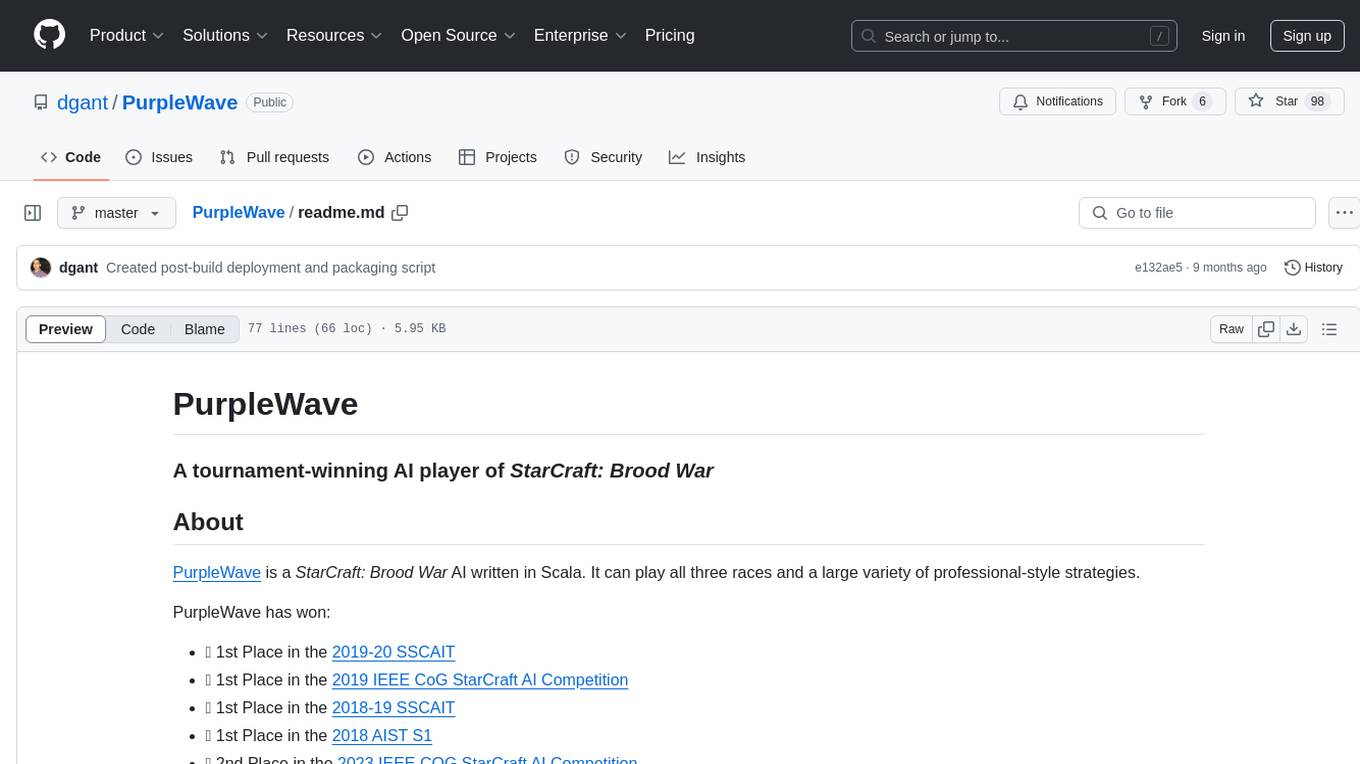
PurpleWave is a tournament-winning AI player for StarCraft: Brood War written in Scala. It has won multiple competitions and is capable of playing all three races with a variety of professional-style strategies. PurpleWave has ranked #1 on various ladders and credits several individuals and communities for its development and success. The tool can be built using specific steps outlined in the readme and run either from IntelliJ IDEA or as a JAR file in the StarCraft directory. PurpleWave is published under the MIT License, encouraging users to use it as a starting point for their own creations.
README:
PurpleWave is a StarCraft: Brood War AI written in Scala. It can play all three races and a large variety of professional-style strategies.
PurpleWave has won:
- 🏆 1st Place in the 2019-20 SSCAIT
- 🏆 1st Place in the 2019 IEEE CoG StarCraft AI Competition
- 🏆 1st Place in the 2018-19 SSCAIT
- 🏆 1st Place in the 2018 AIST S1
- 🥈 2nd Place in the 2023 IEEE COG StarCraft AI Competition
- 🥈 2nd Place in the 2022 IEEE COG StarCraft AI Competition
- 🥈 2nd Place in the 2021 AIST S4
- 🥈 2nd Place in the 2020 AIIDE StarCraft AI Competition
- 🥈 2nd Place in the 2020 IEEE COG StarCraft AI Competition
- 🥈 2nd Place in the 2020 AIST S3
- 🥈 2nd Place in the 2019 AIIDE StarCraft AI Competition
- 🥈 2nd Place in the 2017 AIIDE StarCraft AI Competition
- 🥈 2nd Place in the 2018 IEEE CIG StarCraft AI Competition
- 🥉 3rd Place in the 2023 AIIDE StarCraft AI Competition
- 🥉 3rd Place in the 2022-23 SSCAIT
- 🥉 3rd Place in the 2017 IEEE CIG StarCraft AI Competition
PurpleWave has also ranked #1 on the BASIL, SSCAIT, and SAIL ladders.
Thanks to:
- Nathan Roth (Antiga/Iruian) for strategy advice and consulting -- so much of the polish in PurpleWave's strategies comes from his wisdom and replay analysis
- @JasperGeurtz @Bytekeeper and @N00byEdge for JBWAPI
- @vjurenka for BWMirror
- @Cmccrave for Horizon and BWEB
- @MrTate for JBWEB
- @lowerlogic for BWTA
- Igor Dimitrijevic for BWEM
- @JasperGeurtz for the Java port of BWEM
- @kovarex and @heinermann for BWAPI
- @michalsustr and @certicky for SC-Docker and @Bytekeeper for its BASIL port for powering PotatoPeeler
- @jabbo16 for configuring PurpleWave's Maven build
- @davechurchill @certicky @krasi0 @Bytekeeper @bgweber @SonkoMagnus Nathan Roth and the Cognition & Intelligence Lab at Sejong University for hosting Brood War competitions and environments that have given PurpleWave visibility and purpose
- @chriscoxe for diagnosing and solving technical issues in tournament environments that have affected PurpleWave's ability to compete
- @jaj22/JohnJ and Ankmairdor for lots of advice navigating Brood War mechanics
- @IMP42 @AdakiteSystems and @tscmoo for helping me get BWAPI up and running when I was getting started
- @tscmoo for OpenBW
- NepetaNigra, ChoboSwaggins, @Nitekat, and CH Miner for sharing PurpleWave's games with the world and helping tell our story
The community around BWAPI and StarCraft AI is amazing and PurpleWave could not exist without building on the decade of work these folks have done.
See build instructions in install.md
Steps:
- Clone or download this repository (I keep it in c:\p\pw but it should work from anywhere)
- If you cloned the repository
git submodule sync; git submodule update --init --recursiveto clone JBWAPI - Open IntelliJ IDEA
- In IntelliJ IDEA: File -> Settings -> Plugins -> Check off Scala
- In IntelliJ IDEA: File -> Open -> Select the PurpleWave directory
- In IntelliJ IDEA: File -> Project Structure -> Select the Java Development Kit directory (like c:\Program Files\Java\jdk\1.8.0_121)
- In IntelliJ IDEA: File -> Project Structure -> Modules -> The green "+" -> Scala -> Create... -> Download... -> 2.12.6... -> OK
- In IntelliJ IDEA: File -> Project Structure -> Modules -> Dependencies -> Under "Export" check scala-sdk-2.12.6
- In IntelliJ IDEA: Build -> Build Artifacts... -> Build
This will produce PurpleWave.jar. See below for "How to run PurpleWave"
- From IntelliJ IDEA: Run -> Run 'PurpleWave' or Debug 'PurpleWave'
- As a JAR:
-
cdto the StarCraft directory -
mkdir -p bwapi-data/AI; mkdir -p bwapi-data/read; mkdir -p bwapi-data/writeto create the standard directories for BWAPI bot data - Copy PurpleWave.jar to
bwapi-data/AI -
java.exe -jar bwapi-data/AI/PurpleWave.jar<-- Run this from the StarCraft directory
-
Say hi! Post an issue here on Github or email dsgant at gmail
PurpleWave is published under the MIT License. I encourage you to use PurpleWave as a starting point for your own creation!
For Tasks:
Click tags to check more tools for each tasksFor Jobs:
Alternative AI tools for PurpleWave
Similar Open Source Tools

PurpleWave
PurpleWave is a tournament-winning AI player for StarCraft: Brood War written in Scala. It has won multiple competitions and is capable of playing all three races with a variety of professional-style strategies. PurpleWave has ranked #1 on various ladders and credits several individuals and communities for its development and success. The tool can be built using specific steps outlined in the readme and run either from IntelliJ IDEA or as a JAR file in the StarCraft directory. PurpleWave is published under the MIT License, encouraging users to use it as a starting point for their own creations.
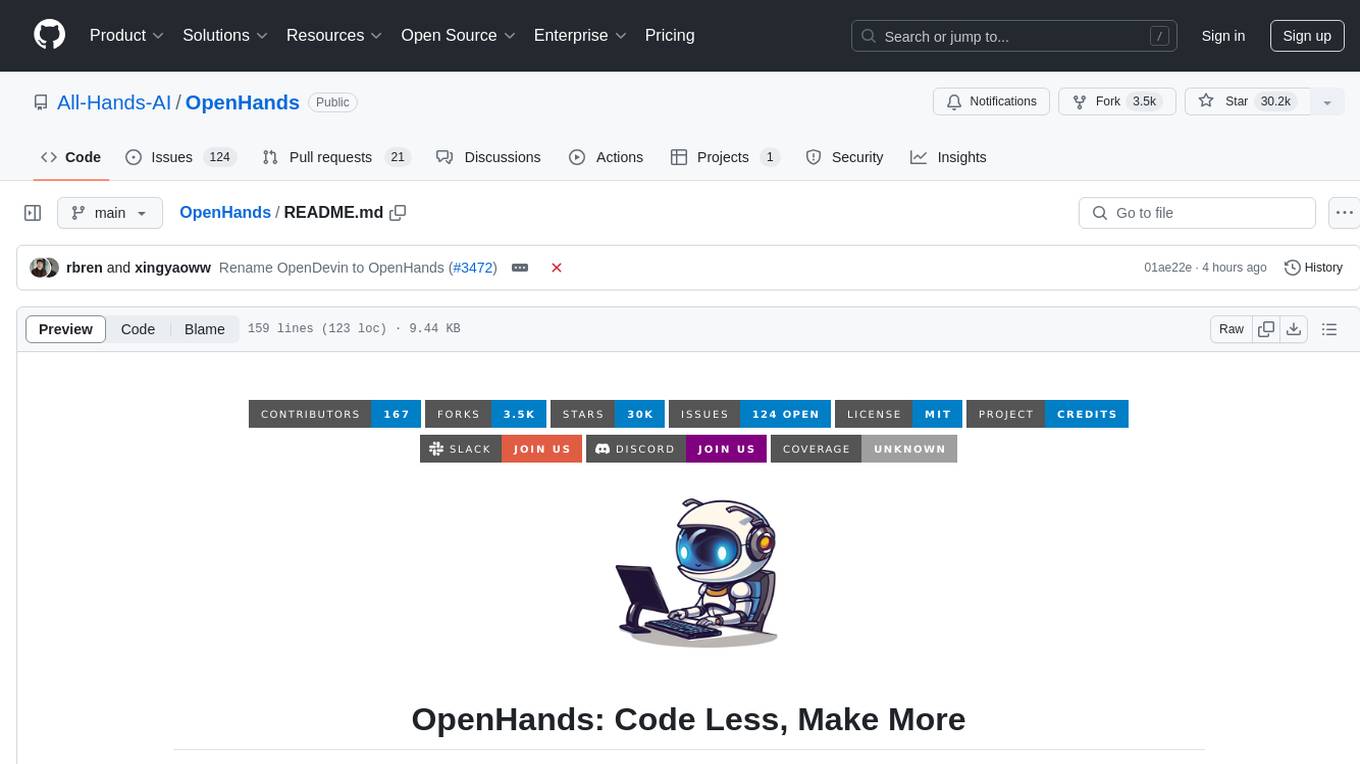
OpenHands
OpenDevin is a platform for autonomous software engineers powered by AI and LLMs. It allows human developers to collaborate with agents to write code, fix bugs, and ship features. The tool operates in a secured docker sandbox and provides access to different LLM providers for advanced configuration options. Users can contribute to the project through code contributions, research and evaluation of LLMs in software engineering, and providing feedback and testing. OpenDevin is community-driven and welcomes contributions from developers, researchers, and enthusiasts looking to advance software engineering with AI.
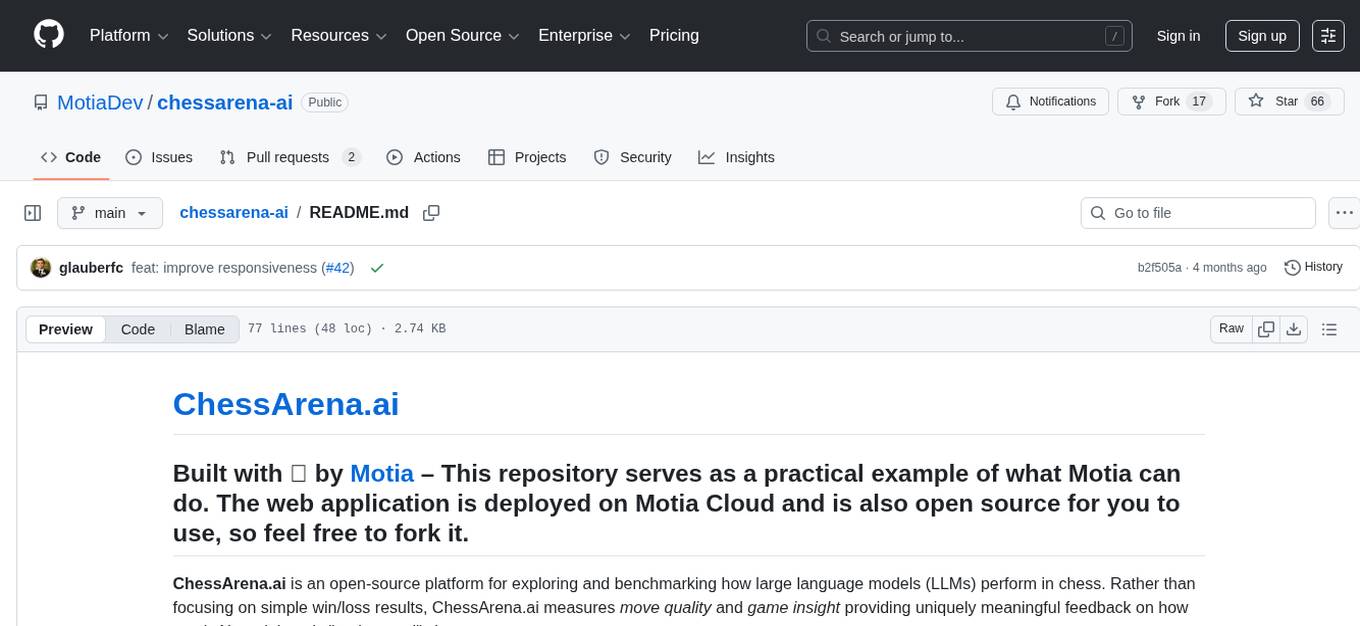
chessarena-ai
ChessArena.ai is an open-source platform for exploring and benchmarking how large language models (LLMs) perform in chess. It measures move quality and game insight, providing meaningful feedback on AI models' understanding of chess. The system evaluates each move played by an LLM, compares it to Stockfish's recommendation, records the difference in centipawns, and identifies blunders. The platform features an LLM Chess Leaderboard, real-time streaming, and event-driven architecture.
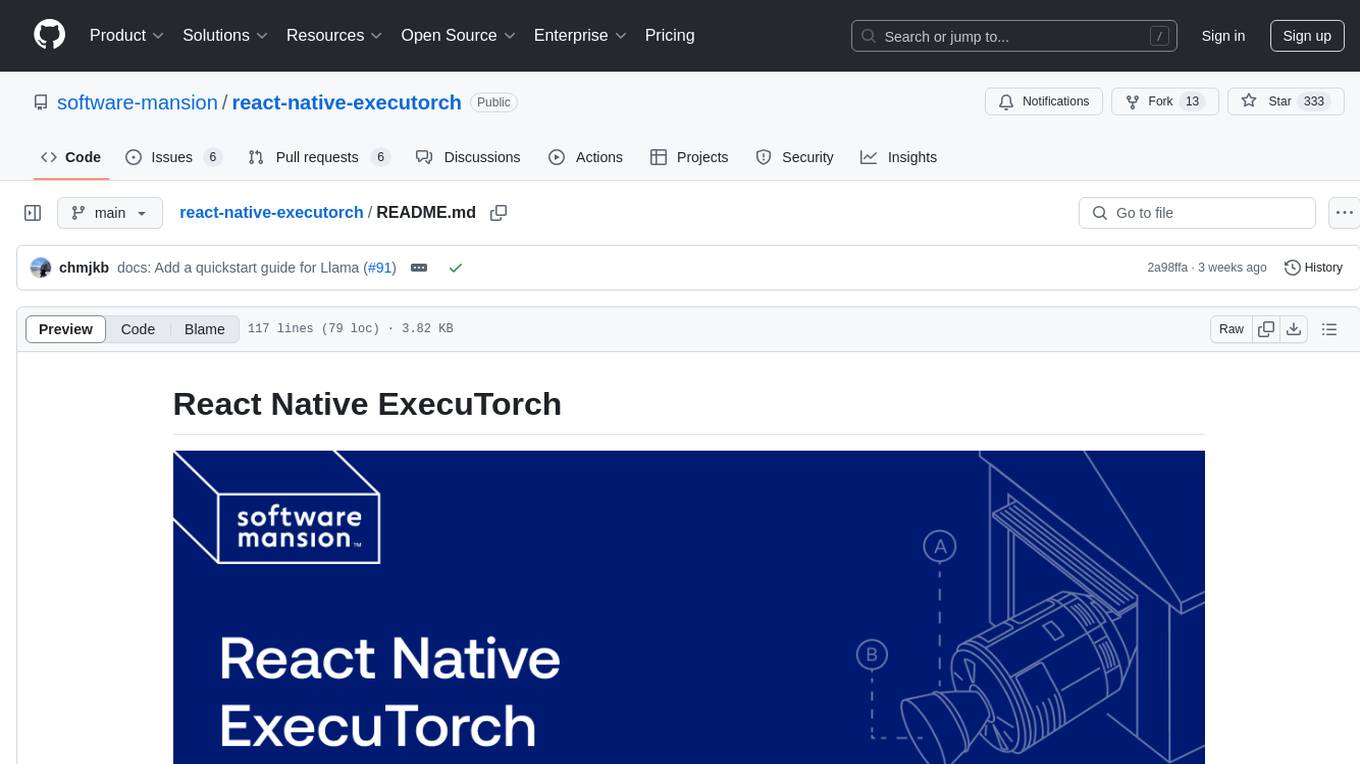
react-native-executorch
React Native ExecuTorch is a framework that allows developers to run AI models on mobile devices using React Native. It bridges the gap between React Native and native platform capabilities, providing high-performance AI model execution without requiring deep knowledge of native code or machine learning internals. The tool supports ready-made models in `.pte` format and offers a Python API for custom models. It is designed to simplify the integration of AI features into React Native apps.
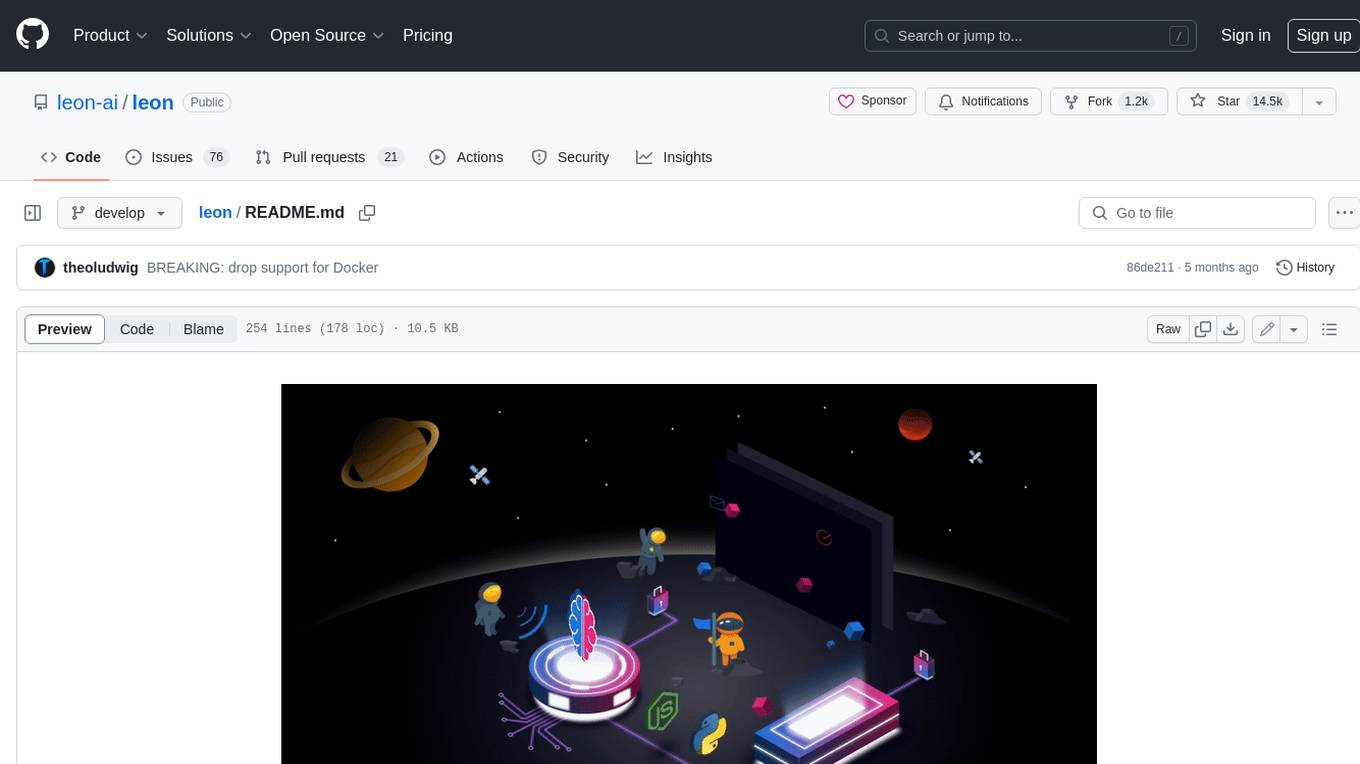
leon
Leon is an open-source personal assistant who can live on your server. He does stuff when you ask him to. You can talk to him and he can talk to you. You can also text him and he can also text you. If you want to, Leon can communicate with you by being offline to protect your privacy.
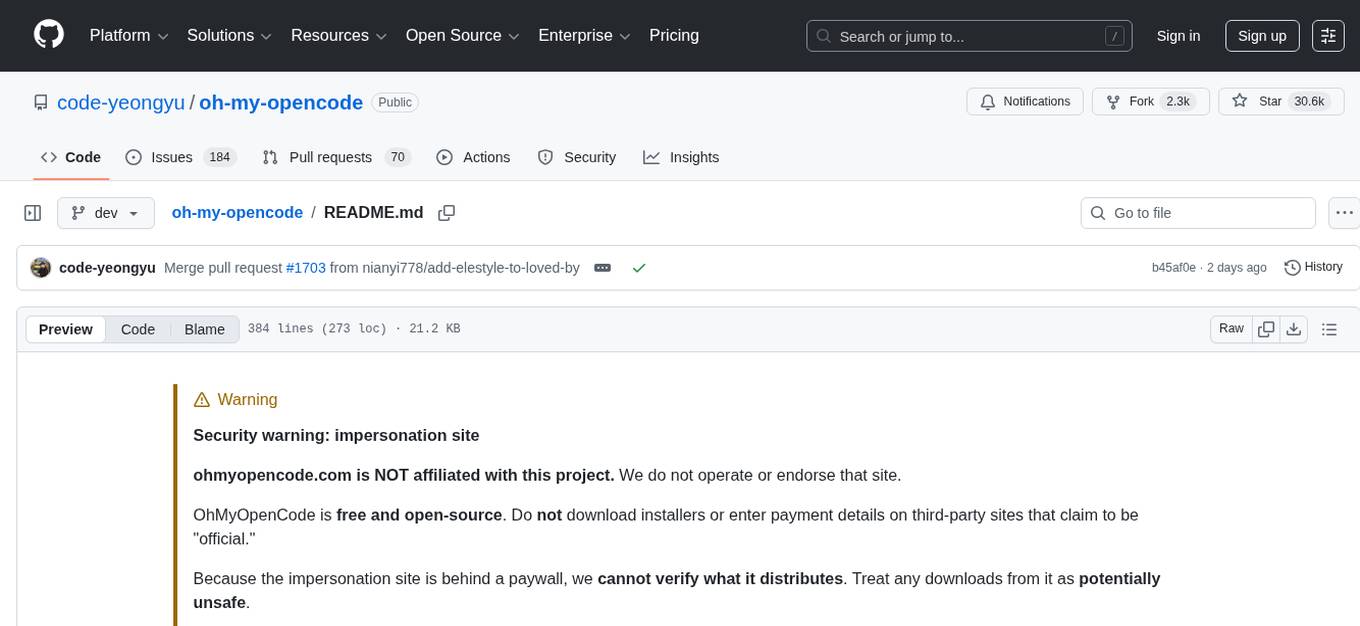
oh-my-opencode
OhMyOpenCode is a free and open-source tool that enhances coding productivity by providing an agent harness for orchestrating multiple models and tools. It offers features like background agents, LSP/AST tools, curated MCPs, and compatibility with various agents like Claude Code. The tool aims to boost productivity, automate tasks, and streamline the coding process for users. It is highly extensible and customizable, catering to both hackers and non-hackers alike, with a focus on enhancing the development experience and performance.
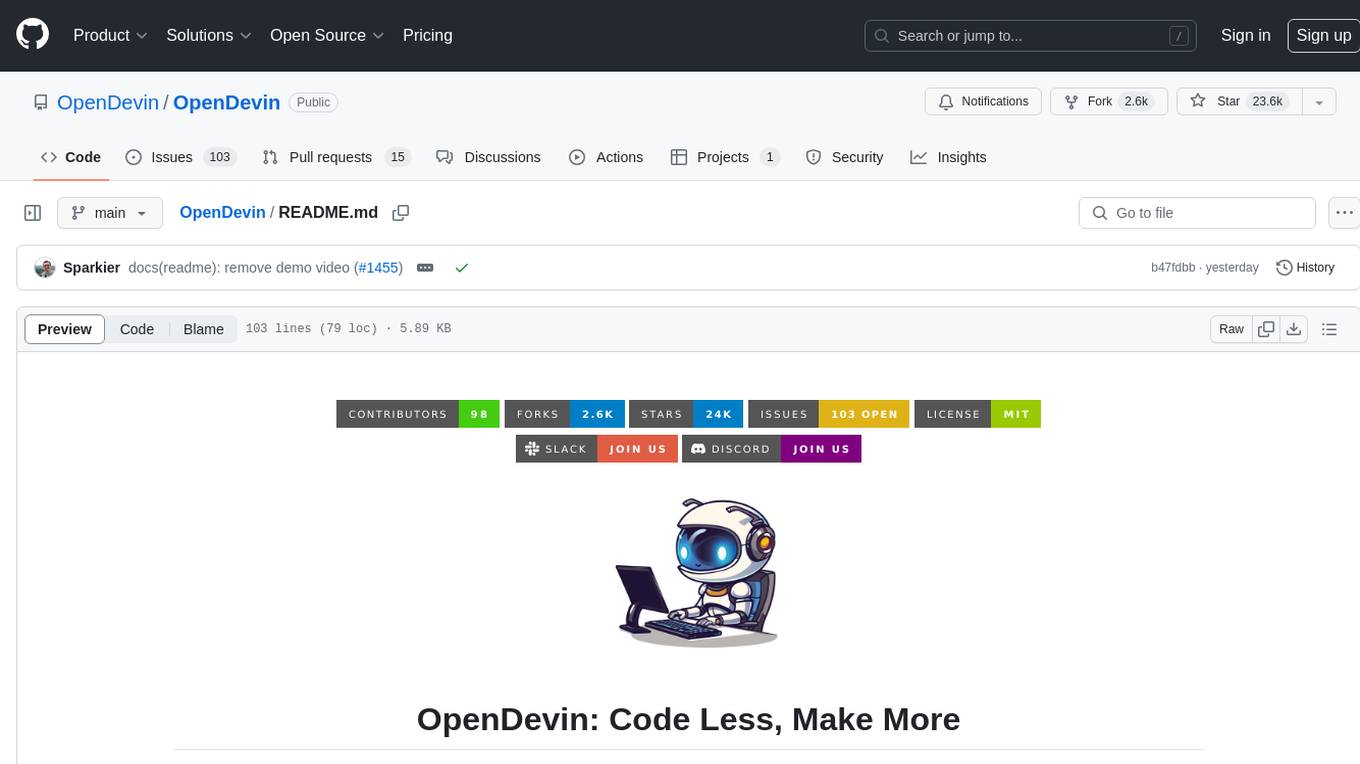
OpenDevin
OpenDevin is an open-source project aiming to replicate Devin, an autonomous AI software engineer capable of executing complex engineering tasks and collaborating actively with users on software development projects. The project aspires to enhance and innovate upon Devin through the power of the open-source community. Users can contribute to the project by developing core functionalities, frontend interface, or sandboxing solutions, participating in research and evaluation of LLMs in software engineering, and providing feedback and testing on the OpenDevin toolset.
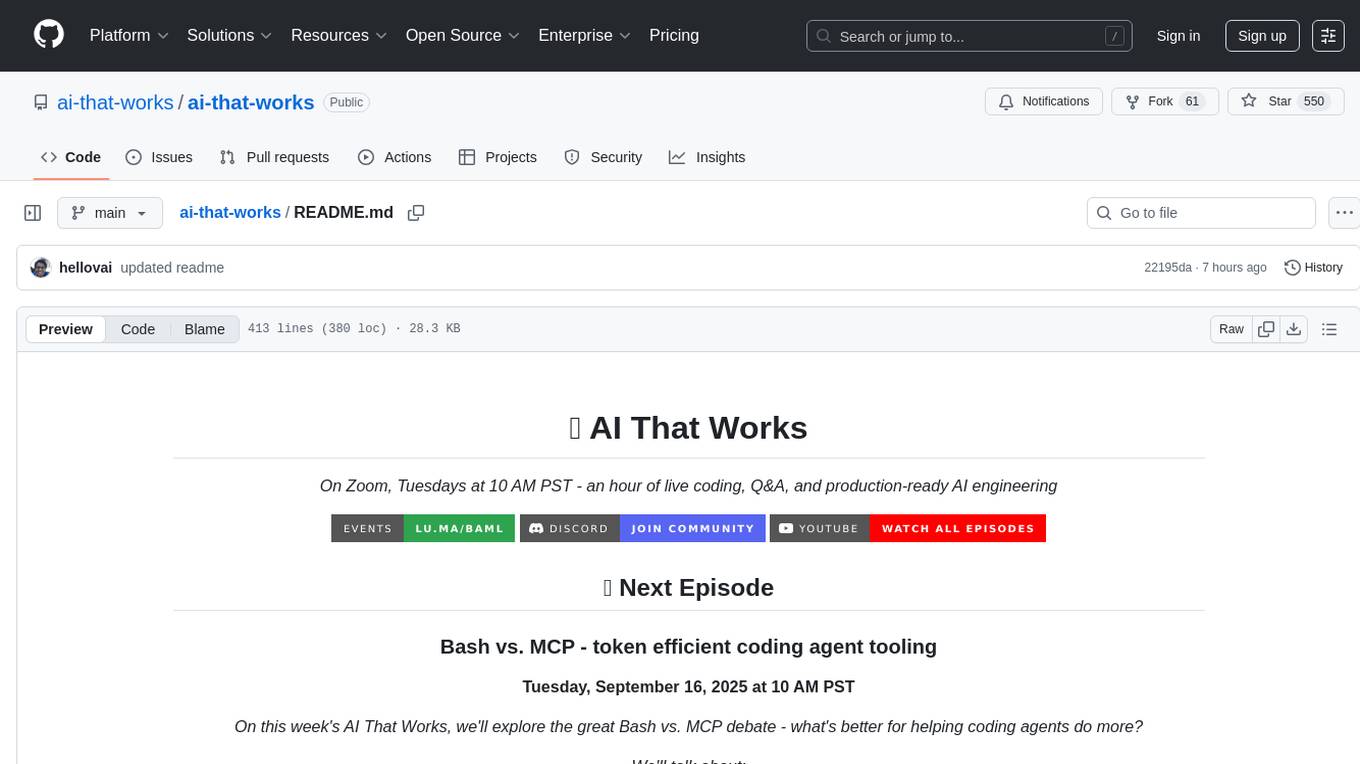
ai-that-works
AI That Works is a weekly live coding event focused on exploring advanced AI engineering techniques and tools to take AI applications from demo to production. The sessions cover topics such as token efficiency, downsides of JSON, writing drop-ins for coding agents, and advanced tricks like .shims for coding tools. The event aims to help participants get the most out of today's AI models and tools through live coding, Q&A sessions, and production-ready insights.

MetaGPT
MetaGPT is a multi-agent framework that enables GPT to work in a software company, collaborating to tackle more complex tasks. It assigns different roles to GPTs to form a collaborative entity for complex tasks. MetaGPT takes a one-line requirement as input and outputs user stories, competitive analysis, requirements, data structures, APIs, documents, etc. Internally, MetaGPT includes product managers, architects, project managers, and engineers. It provides the entire process of a software company along with carefully orchestrated SOPs. MetaGPT's core philosophy is "Code = SOP(Team)", materializing SOP and applying it to teams composed of LLMs.
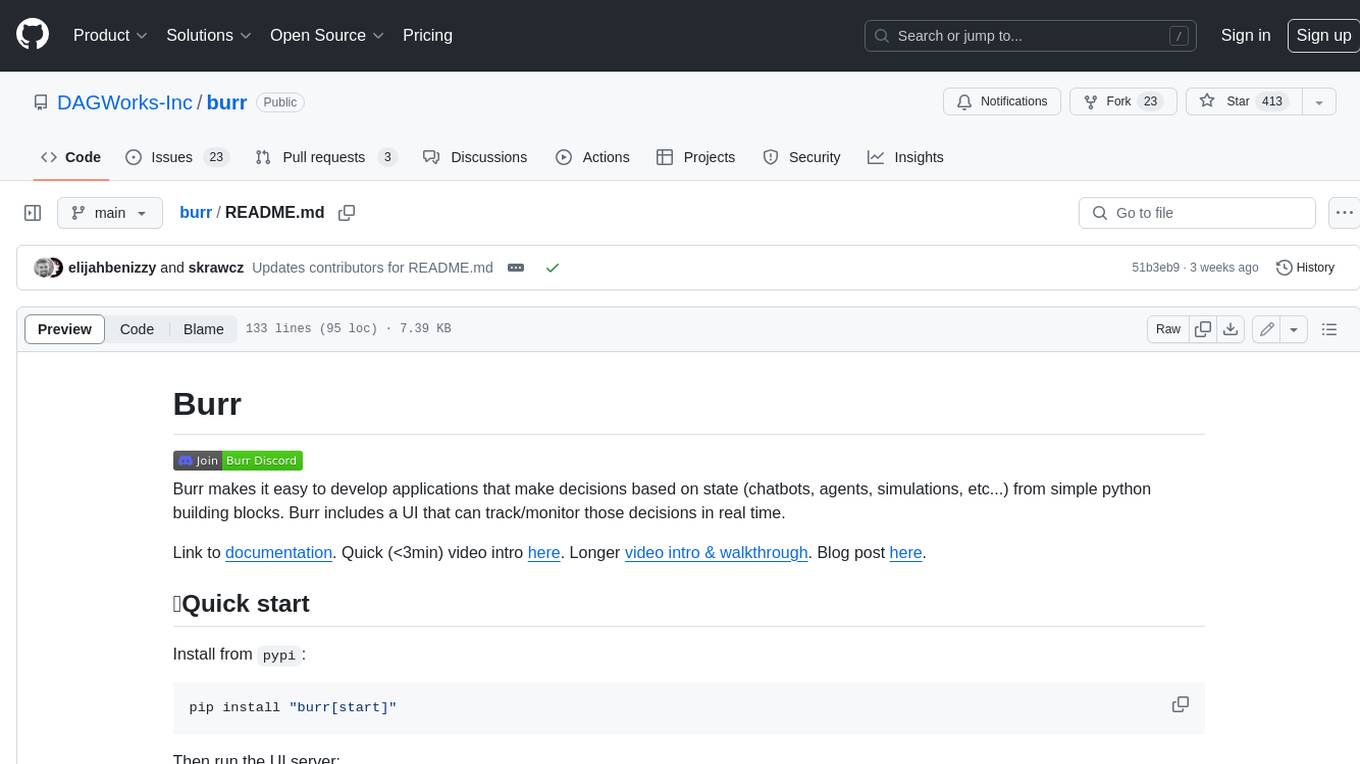
burr
Burr is a Python library and UI that makes it easy to develop applications that make decisions based on state (chatbots, agents, simulations, etc...). Burr includes a UI that can track/monitor those decisions in real time.
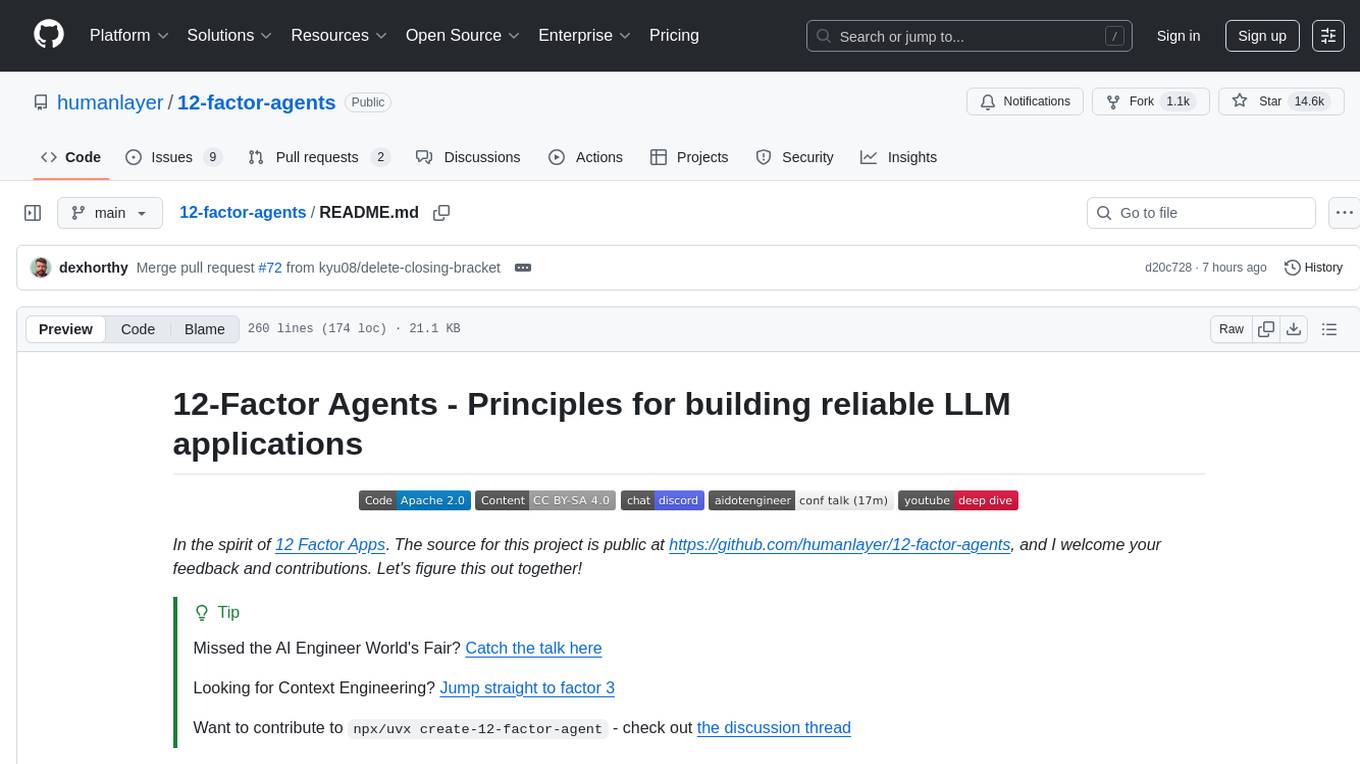
12-factor-agents
12-Factor Agents is a project focused on building reliable LLM-powered software by outlining 12 core engineering principles. The project aims to provide guidance on creating production-ready customer-facing agents that leverage AI technology effectively. It emphasizes the importance of software design, context management, tool integration, and control flow in developing high-quality AI agents. The project offers insights, design patterns, and practical advice for software engineers looking to enhance their AI applications with agent-based approaches.
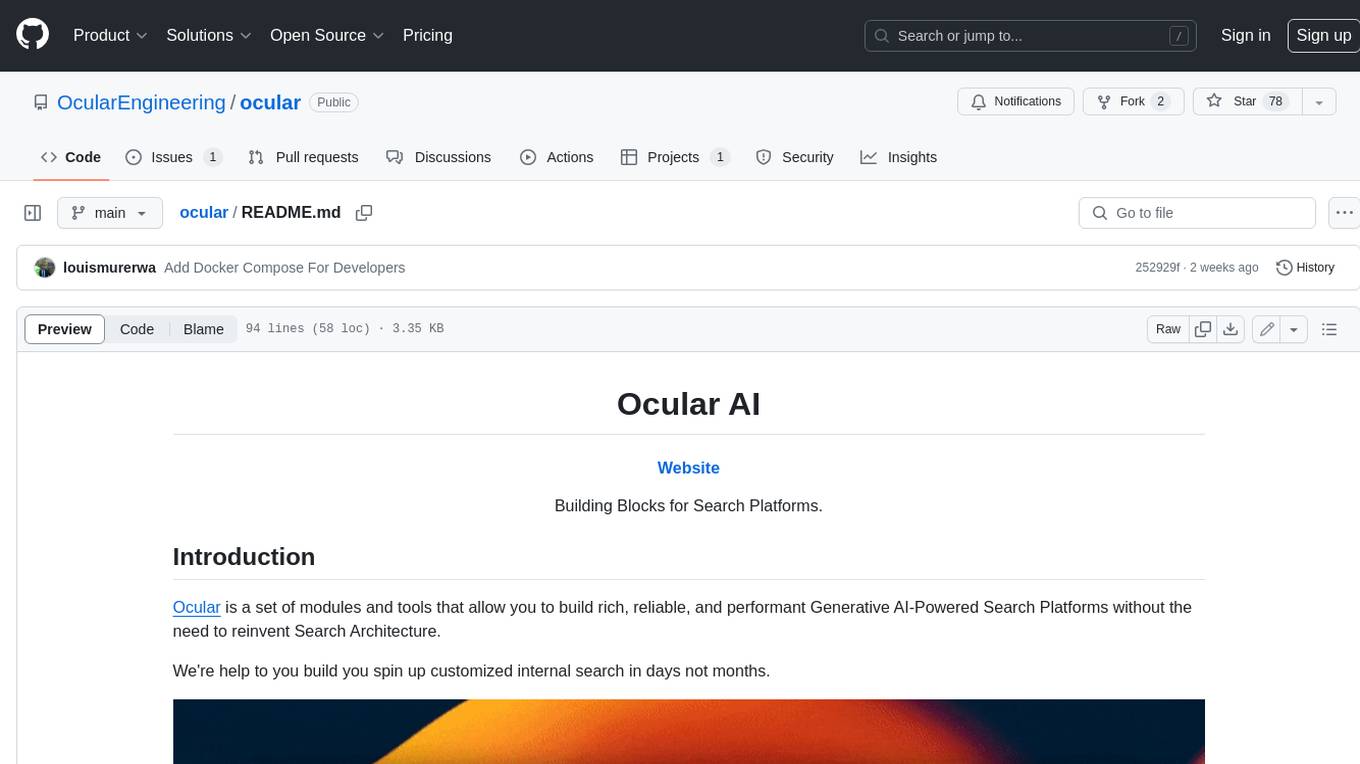
ocular
Ocular is a set of modules and tools that allow you to build rich, reliable, and performant Generative AI-Powered Search Platforms without the need to reinvent Search Architecture. We help you build you spin up customized internal search in days not months.

DemoGPT
DemoGPT is an all-in-one agent library that provides tools, prompts, frameworks, and LLM models for streamlined agent development. It leverages GPT-3.5-turbo to generate LangChain code, creating interactive Streamlit applications. The tool is designed for creating intelligent, interactive, and inclusive solutions in LLM-based application development. It offers model flexibility, iterative development, and a commitment to user engagement. Future enhancements include integrating Gorilla for autonomous API usage and adding a publicly available database for refining the generation process.
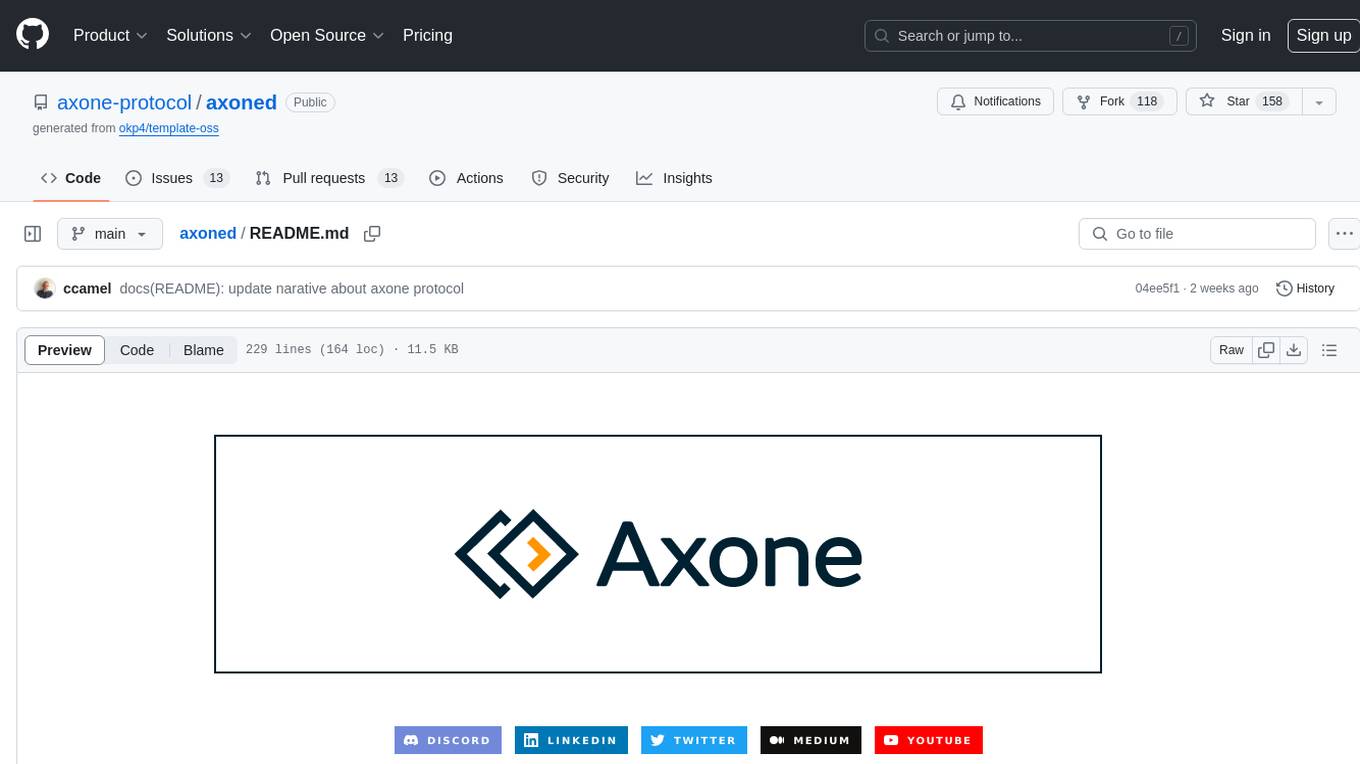
axoned
Axone is a public dPoS layer 1 designed for connecting, sharing, and monetizing resources in the AI stack. It is an open network for collaborative AI workflow management compatible with any data, model, or infrastructure, allowing sharing of data, algorithms, storage, compute, APIs, both on-chain and off-chain. The 'axoned' node of the AXONE network is built on Cosmos SDK & Tendermint consensus, enabling companies & individuals to define on-chain rules, share off-chain resources, and create new applications. Validators secure the network by maintaining uptime and staking $AXONE for rewards. The blockchain supports various platforms and follows Semantic Versioning 2.0.0. A docker image is available for quick start, with documentation on querying networks, creating wallets, starting nodes, and joining networks. Development involves Go and Cosmos SDK, with smart contracts deployed on the AXONE blockchain. The project provides a Makefile for building, installing, linting, and testing. Community involvement is encouraged through Discord, open issues, and pull requests.
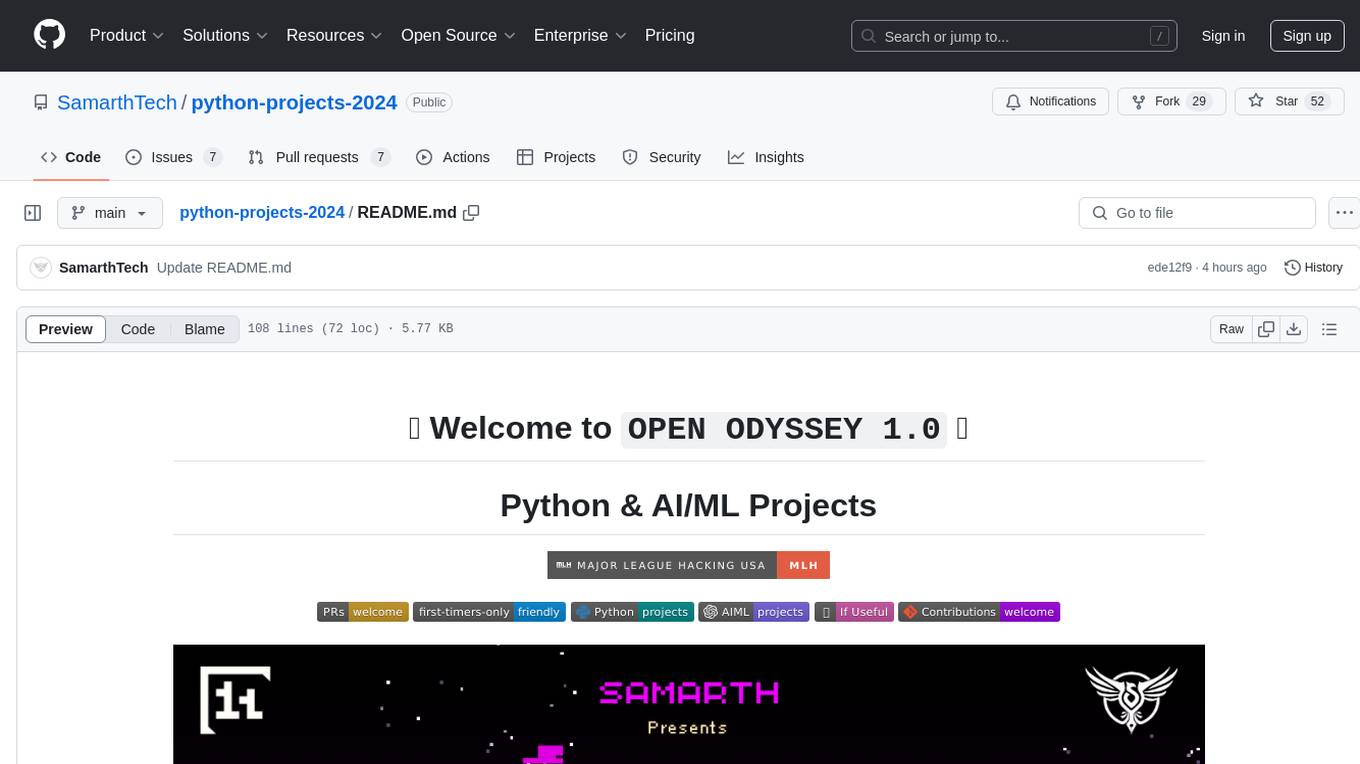
python-projects-2024
Welcome to `OPEN ODYSSEY 1.0` - an Open-source extravaganza for Python and AI/ML Projects. Collaborating with MLH (Major League Hacking), this repository welcomes contributions in the form of fixing outstanding issues, submitting bug reports or new feature requests, adding new projects, implementing new models, and encouraging creativity. Follow the instructions to contribute by forking the repository, cloning it to your PC, creating a new folder for your project, and making a pull request. The repository also features a special Leaderboard for top contributors and offers certificates for all participants and mentors. Follow `OPEN ODYSSEY 1.0` on social media for swift approval of your quest.
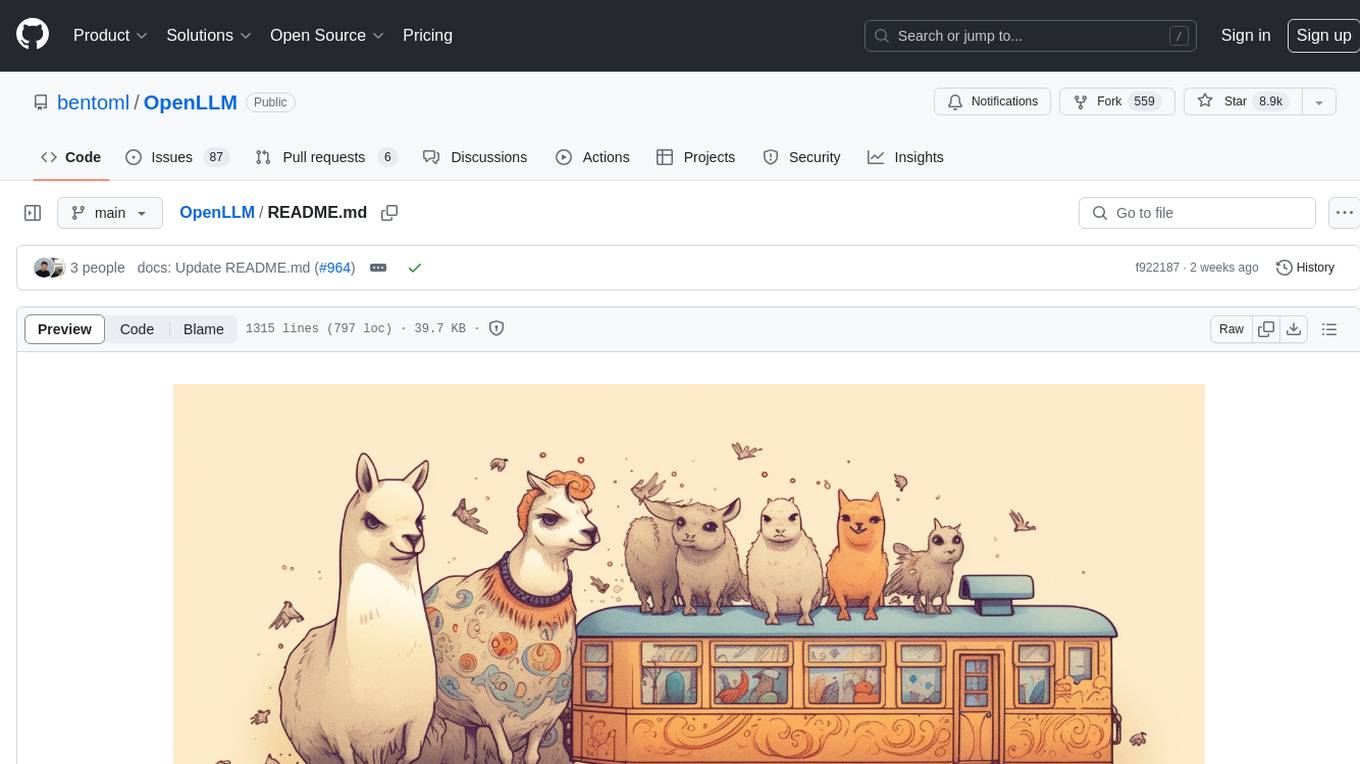
OpenLLM
OpenLLM is a platform that helps developers run any open-source Large Language Models (LLMs) as OpenAI-compatible API endpoints, locally and in the cloud. It supports a wide range of LLMs, provides state-of-the-art serving and inference performance, and simplifies cloud deployment via BentoML. Users can fine-tune, serve, deploy, and monitor any LLMs with ease using OpenLLM. The platform also supports various quantization techniques, serving fine-tuning layers, and multiple runtime implementations. OpenLLM seamlessly integrates with other tools like OpenAI Compatible Endpoints, LlamaIndex, LangChain, and Transformers Agents. It offers deployment options through Docker containers, BentoCloud, and provides a community for collaboration and contributions.
For similar tasks

PurpleWave
PurpleWave is a tournament-winning AI player for StarCraft: Brood War written in Scala. It has won multiple competitions and is capable of playing all three races with a variety of professional-style strategies. PurpleWave has ranked #1 on various ladders and credits several individuals and communities for its development and success. The tool can be built using specific steps outlined in the readme and run either from IntelliJ IDEA or as a JAR file in the StarCraft directory. PurpleWave is published under the MIT License, encouraging users to use it as a starting point for their own creations.
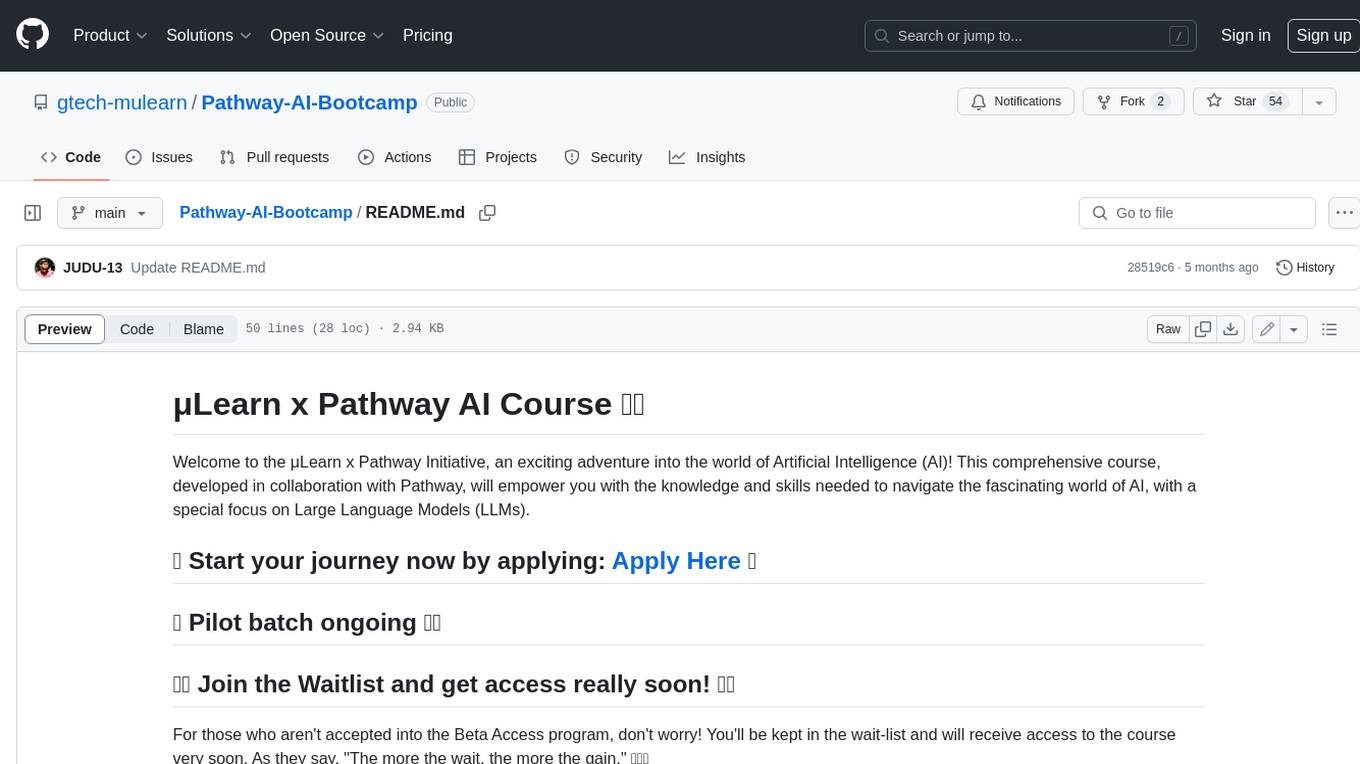
Pathway-AI-Bootcamp
Welcome to the μLearn x Pathway Initiative, an exciting adventure into the world of Artificial Intelligence (AI)! This comprehensive course, developed in collaboration with Pathway, will empower you with the knowledge and skills needed to navigate the fascinating world of AI, with a special focus on Large Language Models (LLMs).
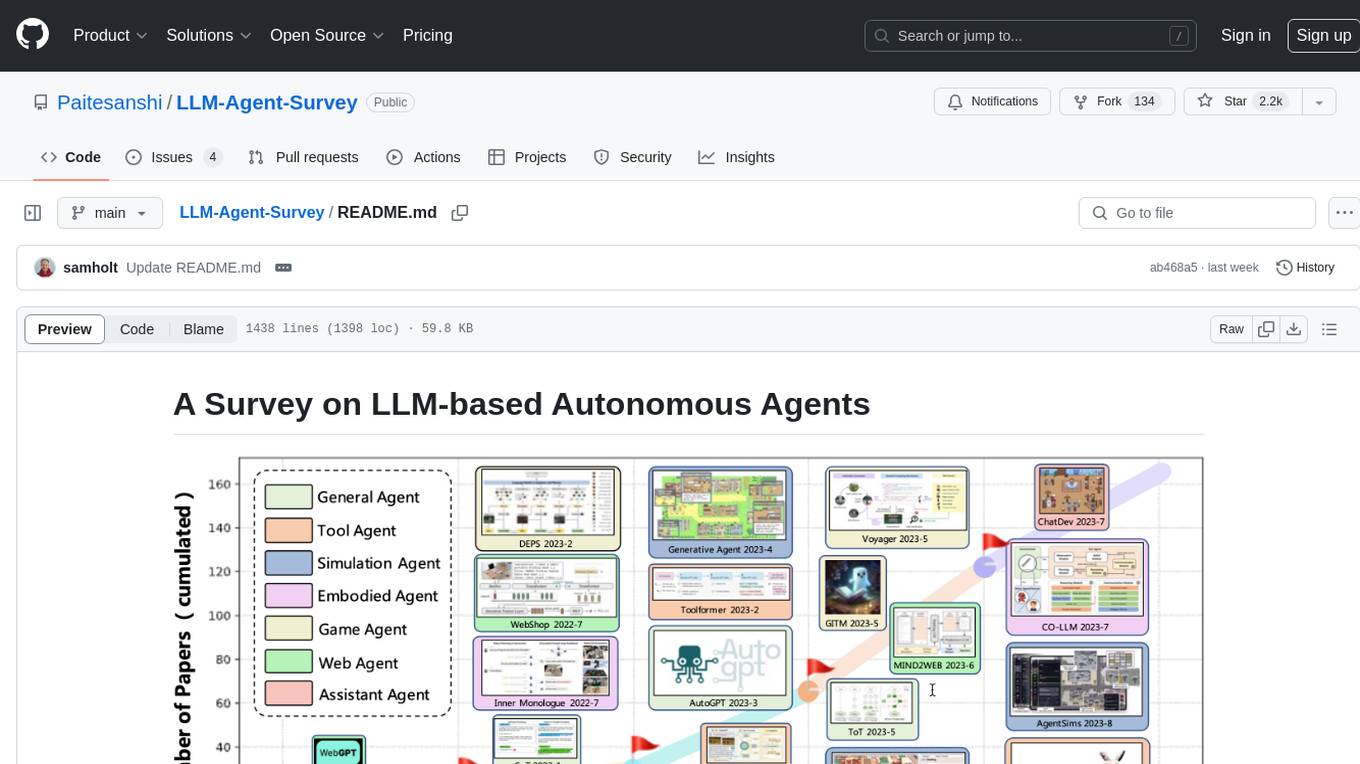
LLM-Agent-Survey
Autonomous agents are designed to achieve specific objectives through self-guided instructions. With the emergence and growth of large language models (LLMs), there is a growing trend in utilizing LLMs as fundamental controllers for these autonomous agents. This repository conducts a comprehensive survey study on the construction, application, and evaluation of LLM-based autonomous agents. It explores essential components of AI agents, application domains in natural sciences, social sciences, and engineering, and evaluation strategies. The survey aims to be a resource for researchers and practitioners in this rapidly evolving field.

genkit
Firebase Genkit (beta) is a framework with powerful tooling to help app developers build, test, deploy, and monitor AI-powered features with confidence. Genkit is cloud optimized and code-centric, integrating with many services that have free tiers to get started. It provides unified API for generation, context-aware AI features, evaluation of AI workflow, extensibility with plugins, easy deployment to Firebase or Google Cloud, observability and monitoring with OpenTelemetry, and a developer UI for prototyping and testing AI features locally. Genkit works seamlessly with Firebase or Google Cloud projects through official plugins and templates.
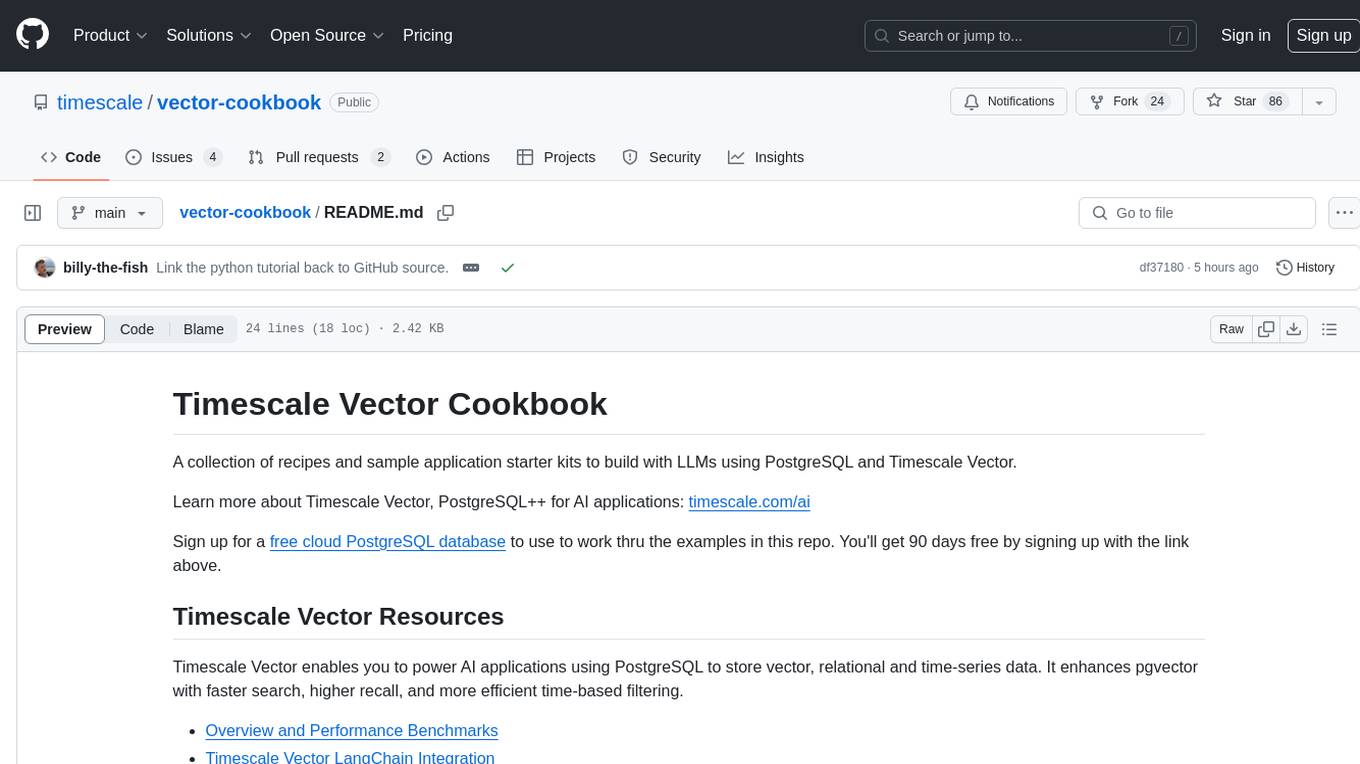
vector-cookbook
The Vector Cookbook is a collection of recipes and sample application starter kits for building AI applications with LLMs using PostgreSQL and Timescale Vector. Timescale Vector enhances PostgreSQL for AI applications by enabling the storage of vector, relational, and time-series data with faster search, higher recall, and more efficient time-based filtering. The repository includes resources, sample applications like TSV Time Machine, and guides for creating, storing, and querying OpenAI embeddings with PostgreSQL and pgvector. Users can learn about Timescale Vector, explore performance benchmarks, and access Python client libraries and tutorials.
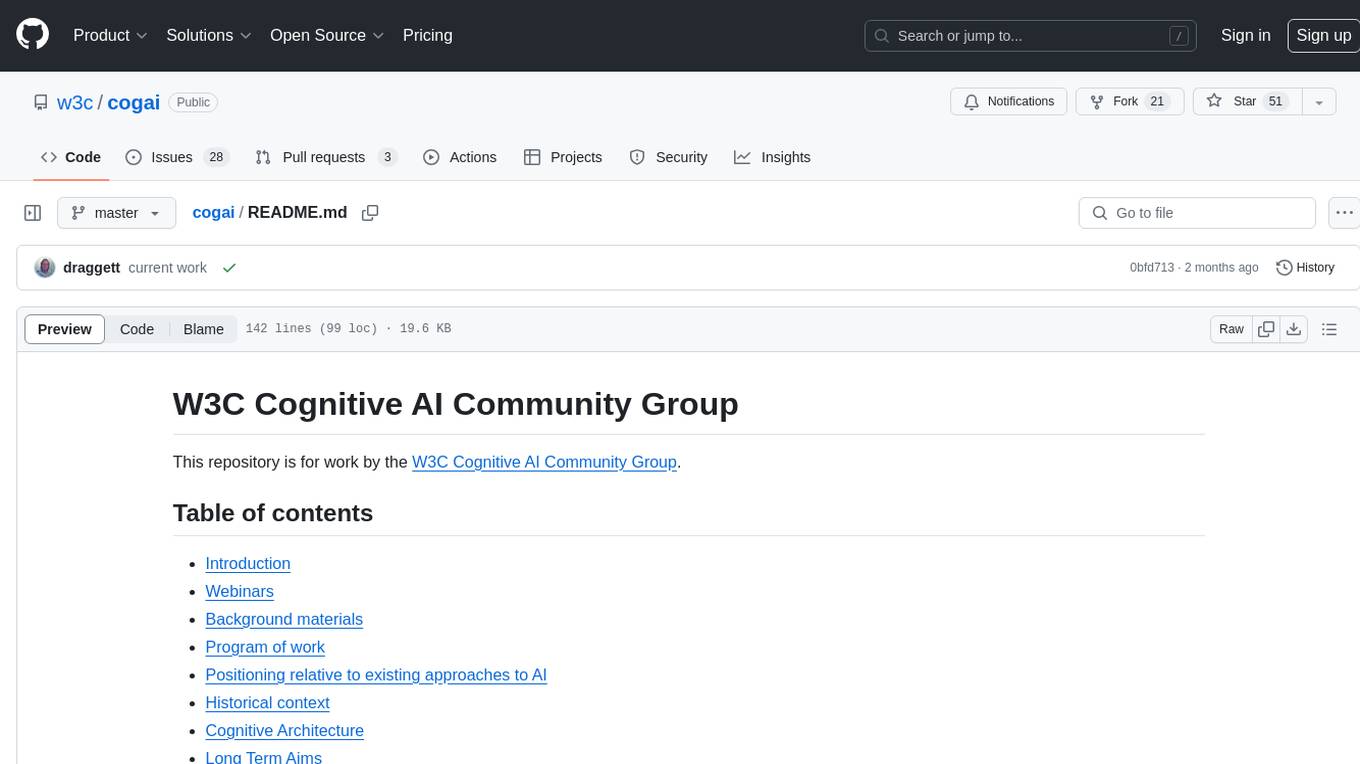
cogai
The W3C Cognitive AI Community Group focuses on advancing Cognitive AI through collaboration on defining use cases, open source implementations, and application areas. The group aims to demonstrate the potential of Cognitive AI in various domains such as customer services, healthcare, cybersecurity, online learning, autonomous vehicles, manufacturing, and web search. They work on formal specifications for chunk data and rules, plausible knowledge notation, and neural networks for human-like AI. The group positions Cognitive AI as a combination of symbolic and statistical approaches inspired by human thought processes. They address research challenges including mimicry, emotional intelligence, natural language processing, and common sense reasoning. The long-term goal is to develop cognitive agents that are knowledgeable, creative, collaborative, empathic, and multilingual, capable of continual learning and self-awareness.
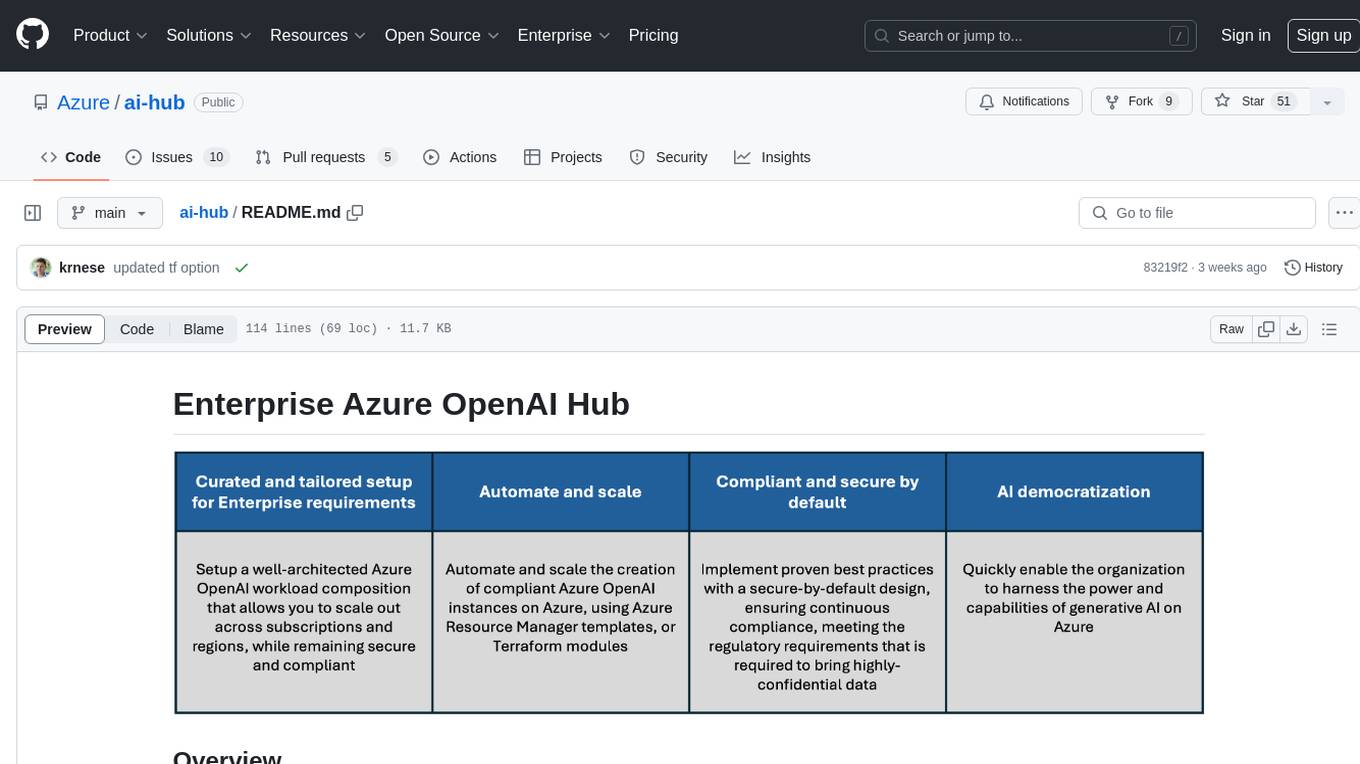
ai-hub
The Enterprise Azure OpenAI Hub is a comprehensive repository designed to guide users through the world of Generative AI on the Azure platform. It offers a structured learning experience to accelerate the transition from concept to production in an Enterprise context. The hub empowers users to explore various use cases with Azure services, ensuring security and compliance. It provides real-world examples and playbooks for practical insights into solving complex problems and developing cutting-edge AI solutions. The repository also serves as a library of proven patterns, aligning with industry standards and promoting best practices for secure and compliant AI development.
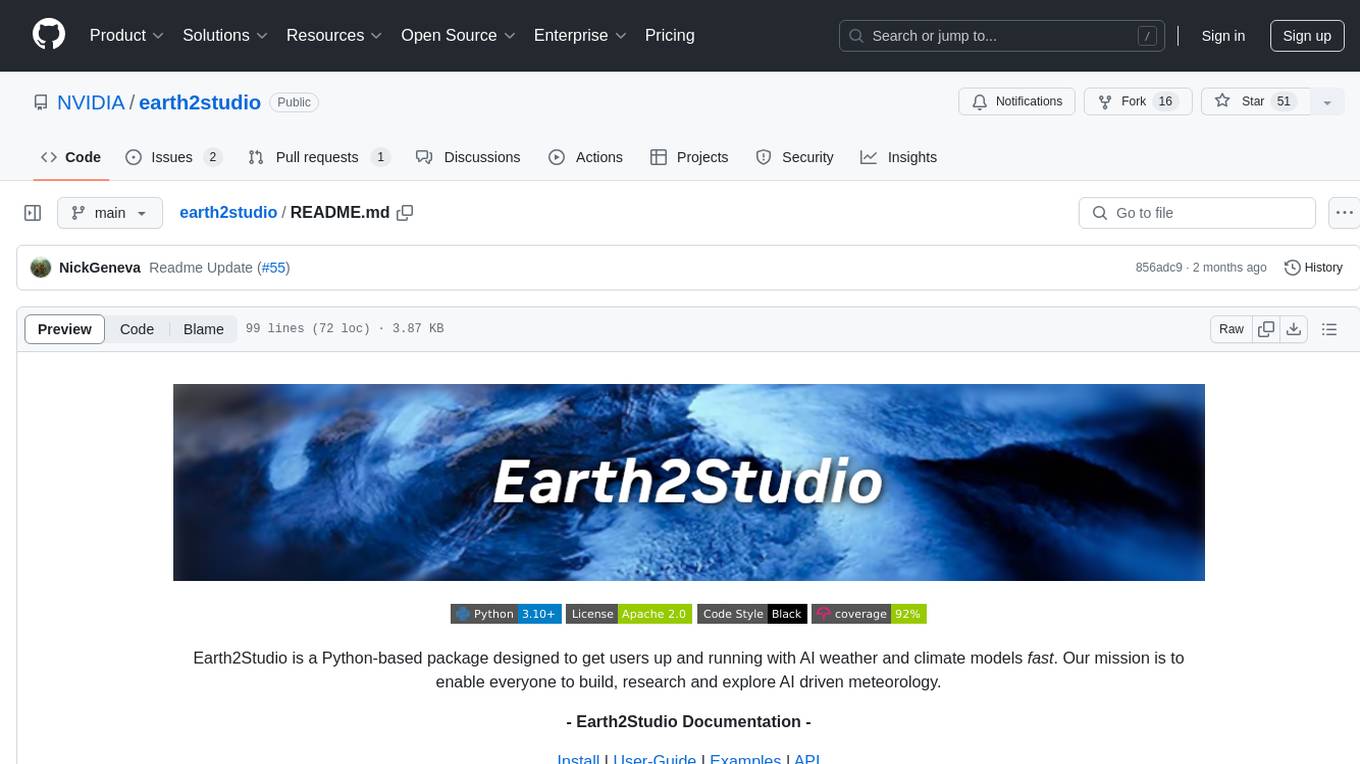
earth2studio
Earth2Studio is a Python-based package designed to enable users to quickly get started with AI weather and climate models. It provides access to pre-trained models, diagnostic tools, data sources, IO utilities, perturbation methods, and sample workflows for building custom weather prediction workflows. The package aims to empower users to explore AI-driven meteorology through modular components and seamless integration with other Nvidia packages like Modulus.
For similar jobs
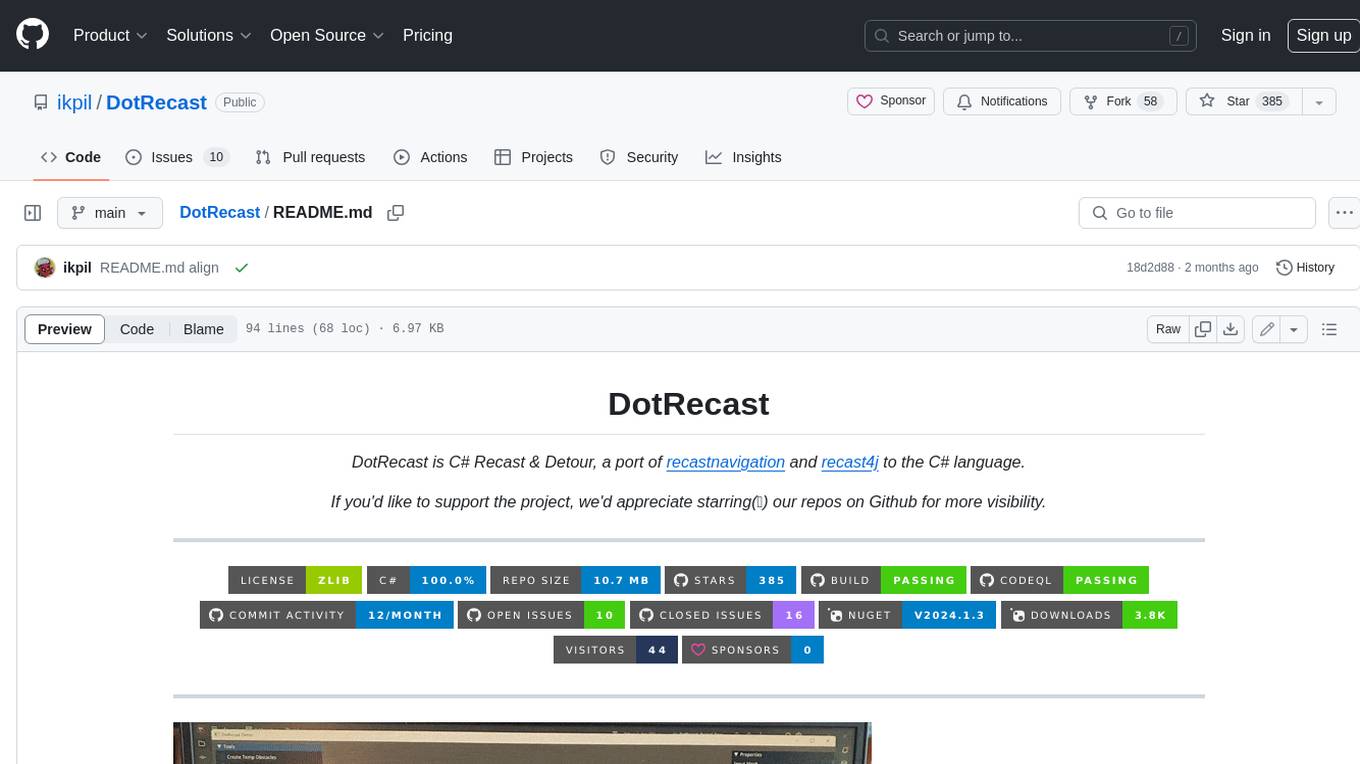
DotRecast
DotRecast is a C# port of Recast & Detour, a navigation library used in many AAA and indie games and engines. It provides automatic navmesh generation, fast turnaround times, detailed customization options, and is dependency-free. Recast Navigation is divided into multiple modules, each contained in its own folder: - DotRecast.Core: Core utils - DotRecast.Recast: Navmesh generation - DotRecast.Detour: Runtime loading of navmesh data, pathfinding, navmesh queries - DotRecast.Detour.TileCache: Navmesh streaming. Useful for large levels and open-world games - DotRecast.Detour.Crowd: Agent movement, collision avoidance, and crowd simulation - DotRecast.Detour.Dynamic: Robust support for dynamic nav meshes combining pre-built voxels with dynamic objects which can be freely added and removed - DotRecast.Detour.Extras: Simple tool to import navmeshes created with A* Pathfinding Project - DotRecast.Recast.Toolset: All modules - DotRecast.Recast.Demo: Standalone, comprehensive demo app showcasing all aspects of Recast & Detour's functionality - Tests: Unit tests Recast constructs a navmesh through a multi-step mesh rasterization process: 1. First Recast rasterizes the input triangle meshes into voxels. 2. Voxels in areas where agents would not be able to move are filtered and removed. 3. The walkable areas described by the voxel grid are then divided into sets of polygonal regions. 4. The navigation polygons are generated by re-triangulating the generated polygonal regions into a navmesh. You can use Recast to build a single navmesh, or a tiled navmesh. Single meshes are suitable for many simple, static cases and are easy to work with. Tiled navmeshes are more complex to work with but better support larger, more dynamic environments. Tiled meshes enable advanced Detour features like re-baking, hierarchical path-planning, and navmesh data-streaming.
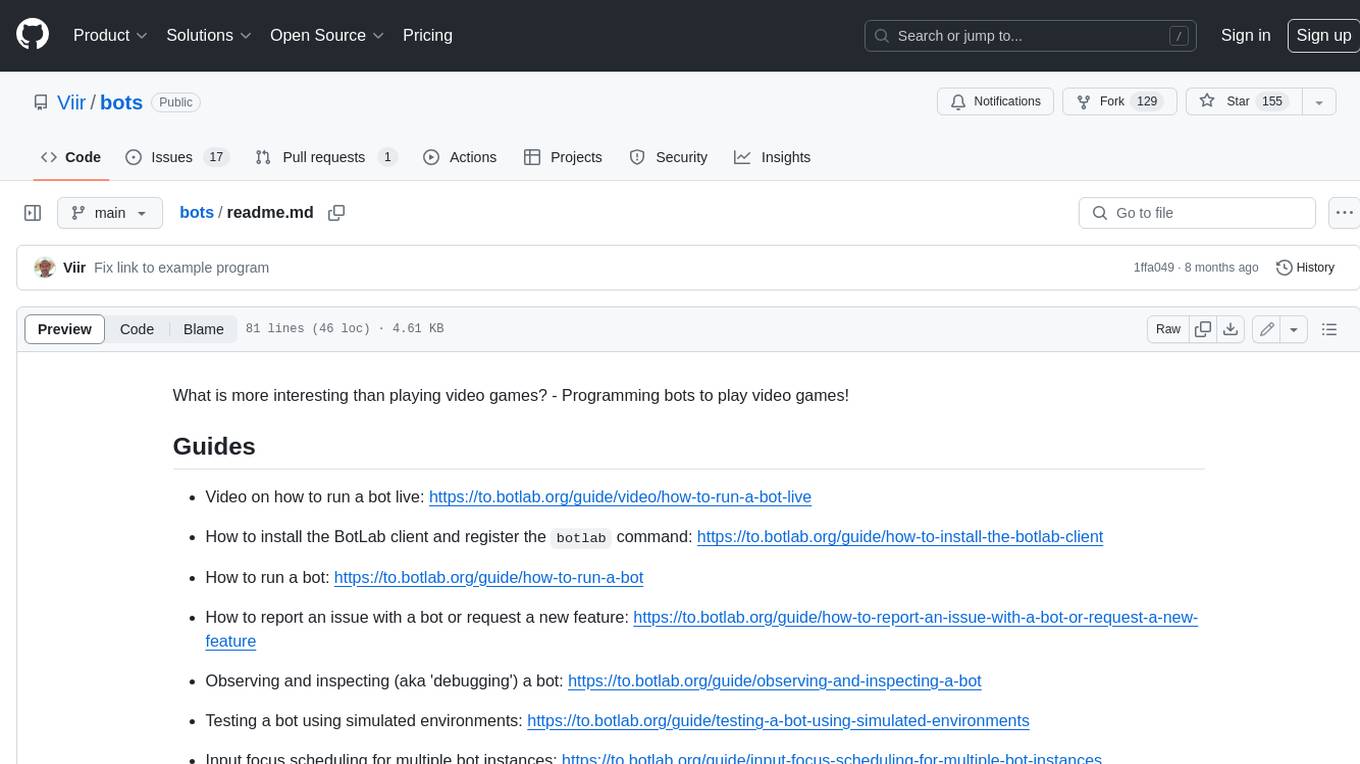
bots
The 'bots' repository is a collection of guides, tools, and example bots for programming bots to play video games. It provides resources on running bots live, installing the BotLab client, debugging bots, testing bots in simulated environments, and more. The repository also includes example bots for games like EVE Online, Tribal Wars 2, and Elvenar. Users can learn about developing bots for specific games, syntax of the Elm programming language, and tools for memory reading development. Additionally, there are guides on bot programming, contributing to BotLab, and exploring Elm syntax and core library.

Half-Life-Resurgence
Half-Life-Resurgence is a recreation and expansion project that brings NPCs, entities, and weapons from the Half-Life series into Garry's Mod. The goal is to faithfully recreate original content while also introducing new features and custom content envisioned by the community. Users can expect a wide range of NPCs with new abilities, AI behaviors, and weapons, as well as support for playing as any character and replacing NPCs in Half-Life 1 & 2 campaigns.
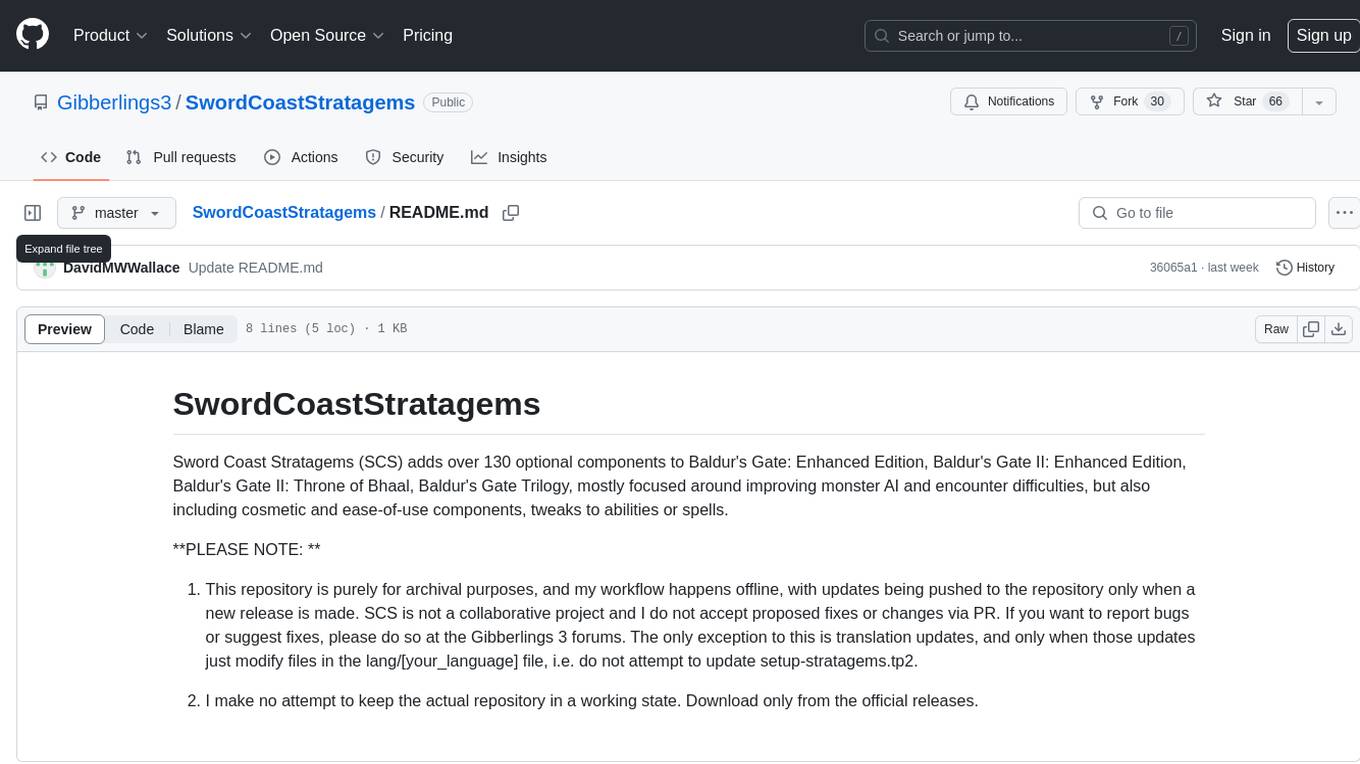
SwordCoastStratagems
Sword Coast Stratagems (SCS) is a mod that enhances Baldur's Gate games by adding over 130 optional components focused on improving monster AI, encounter difficulties, cosmetic enhancements, and ease-of-use tweaks. This repository serves as an archive for the project, with updates pushed only when new releases are made. It is not a collaborative project, and bug reports or suggestions should be made at the Gibberlings 3 forums. The mod is designed for offline workflow and should be downloaded from official releases.
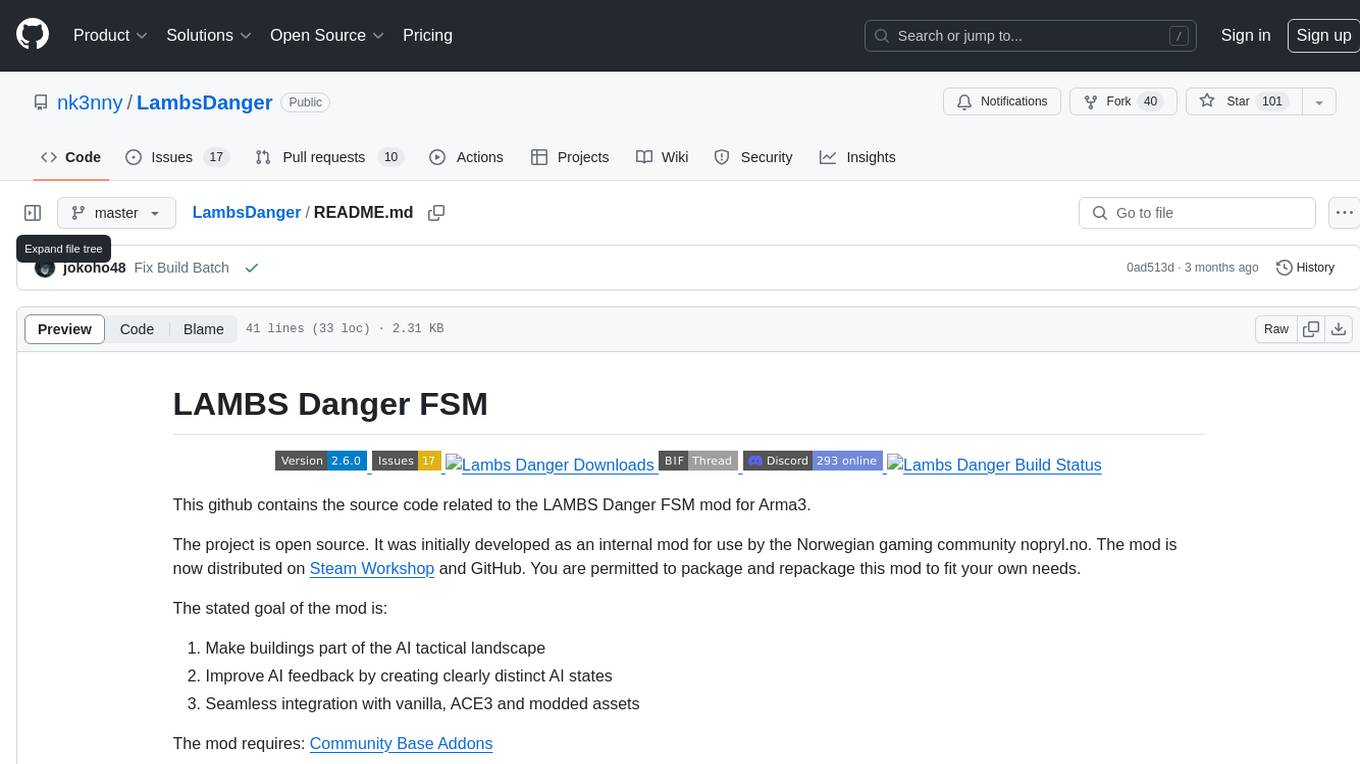
LambsDanger
LAMBS Danger FSM is an open-source mod developed for Arma3, aimed at enhancing the AI behavior by integrating buildings into the tactical landscape, creating distinct AI states, and ensuring seamless compatibility with vanilla, ACE3, and modded assets. Originally created for the Norwegian gaming community, it is now available on Steam Workshop and GitHub for wider use. Users are allowed to customize and redistribute the mod according to their requirements. The project is licensed under the GNU General Public License (GPLv2) with additional amendments.

beehave
Beehave is a powerful addon for Godot Engine that enables users to create robust AI systems using behavior trees. It simplifies the design of complex NPC behaviors, challenging boss battles, and other advanced setups. Beehave allows for the creation of highly adaptive AI that responds to changes in the game world and overcomes unexpected obstacles, catering to both beginners and experienced developers. The tool is currently in development for version 3.0.
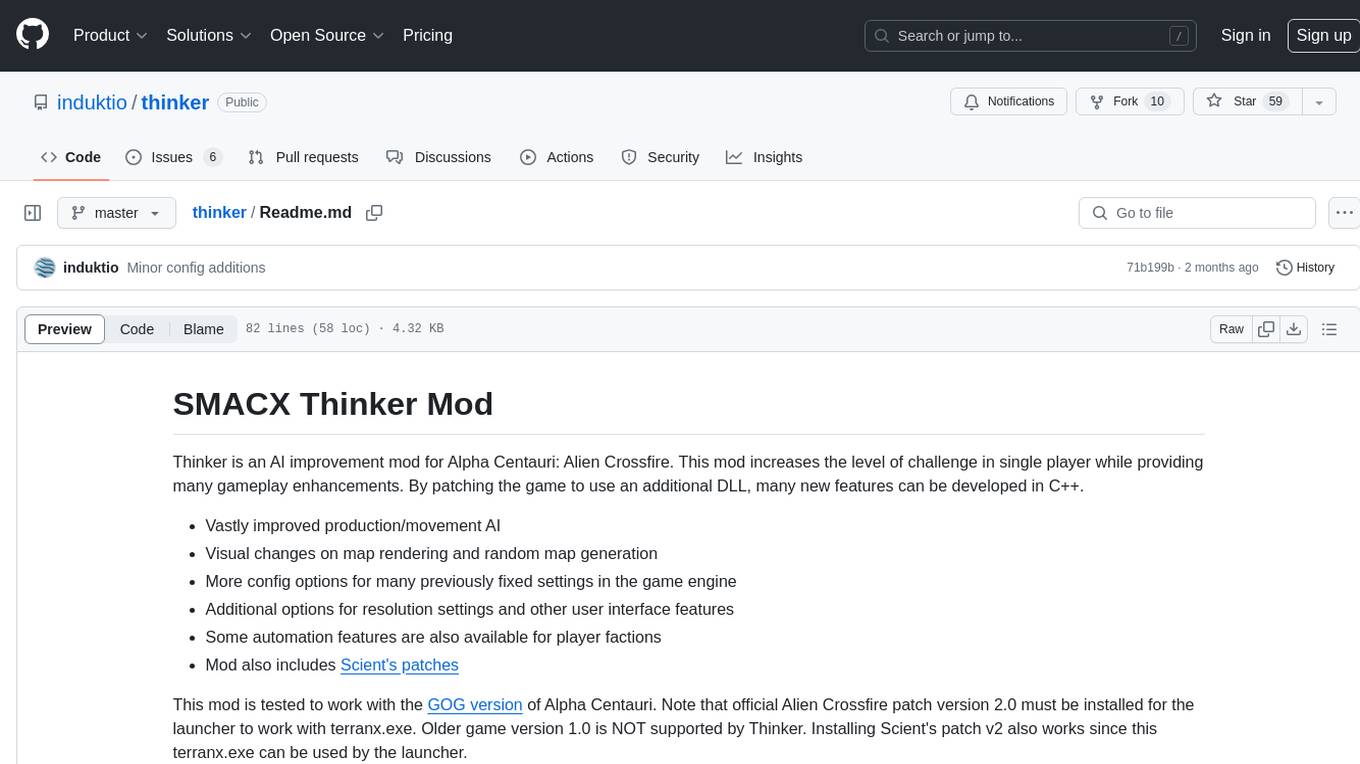
thinker
Thinker is an AI improvement mod for Alpha Centauri: Alien Crossfire that enhances single player challenge and gameplay with features like improved production/movement AI, visual changes on map rendering, more config options, resolution settings, and automation features. It includes Scient's patches and requires the GOG version of Alpha Centauri with the official Alien Crossfire patch version 2.0 installed. The mod provides additional DLL features developed in C++ for a richer gaming experience.
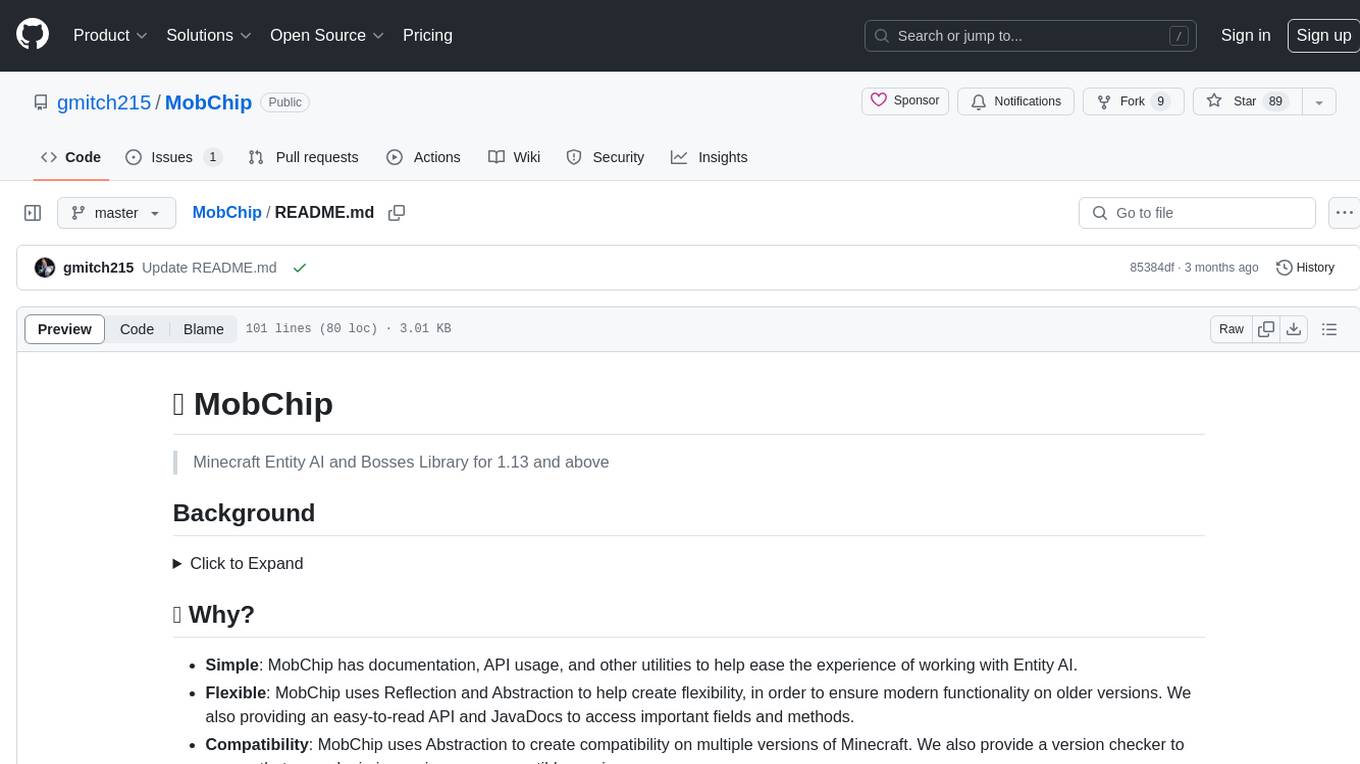
MobChip
MobChip is an all-in-one Entity AI and Bosses Library for Minecraft 1.13 and above. It simplifies the implementation of Minecraft's native entity AI into plugins, offering documentation, API usage, and utilities for ease of use. The library is flexible, using Reflection and Abstraction for modern functionality on older versions, and ensuring compatibility across multiple Minecraft versions. MobChip is open source, providing features like Bosses Library, Pathfinder Goals, Behaviors, Villager Gossip, Ender Dragon Phases, and more.